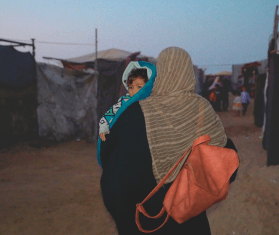Doctors Without Borders/Médecins Sans Frontières (MSF) announced today that it has ceased operations of its rescue vessel, Geo Barents, which had been operational since June 2021. MSF is suspending all search and rescue efforts until further notice, with the intention of restarting again next year with a new ship.
Italian laws and policies have made it impossible to continue with the current operational model. MSF will begin the process of evaluating different operational models to respond to the needs of migrants in this challenging environment.
MSF reaffirms its solid commitment to people on the move, especially those taking the dangerous journey across the Central Mediterranean Sea, a route where over 31,000 people have died or gone missing since 2014.
“MSF will be back as soon as possible to conduct search and rescue operations on one of the deadliest migration routes in the world,” said Juan Matias Gil, MSF search and rescue representative. “We will come back to bear witness and speak out against the violations committed against people on the move by EU members states, particularly by Italy, and the other actors in the area.”

Lifesaving missions face continuous legal obstacles
In the past two years, Geo Barents faced four sanctions by the Italian authorities, imposing a total of 160 days of detention in port. These punitive measures came under the Piantedosi Decree, a law that was introduced by the Italian government in the beginning of 2023 that limits the operations of non-governmental (NGO) rescue ships in the Mediterranean Sea and undermines the maritime historical humanitarian and legal duty to save lives at sea. This month, Italy further intensified the sanctions by making it easier and faster to confiscate humanitarian search and rescue vessels.
The practice of Italian authorities of assigning distant ports, frequently in the north, to disembark people rescued at sea has further undermined the capacity of the Geo Barents to save lives at sea and be present where it is needed the most. Since the implementation of the Piantedosi Decree, the Geo Barents has spent half a year navigating to and back from distant ports instead of assisting people in distress.


From left: An MSF search and rescue team member rescues a child from a boat in distress. Mediterranean Sea 2024 © Simone Boccaccio; passengers on an overcrowded wooden boat rejoice in June as the Geo Barents approaches in response to a distress alert sent via emergency hotline. Mediterranean Sea 2024 © Mohamad Cheblak/MSF
In June 2023, the Italian authorities instructed the Geo Barents, which can fit to up to 600 people on board, to head to La Spezia, in the north of Italy, to disembark 13 survivors. This amounted to navigating more than 600 miles, despite the availability of much closer ports.
“After careful consideration, we have come to the conclusion that it is untenable to operate the Geo Barents under such absurd and senseless Italian laws and policies,” said Gil. “The rescue capacity of humanitarian vessels has been significantly underutilized and actively undermined by the Italian authorities.”
“Italy’s laws and policies express genuine disregard for the lives of people crossing the Mediterranean,” said Margot Bernard, MSF project coordinator. “The stories of tens of thousands of survivors are echoed everywhere on the Geo Barents. Babies have taken their first steps on these decks; people have mourned their loved ones. When European deterrence policies cause so much suffering and cost so many lives, we have the duty to persist in favor of humanity.”

MSF’s work supporting search and rescue in the Mediterranean
MSF has been active and engaged in search and rescue activities in the Central Mediterranean Sea since 2015, working on eight different vessels (alone or in partnership with other NGOs) and rescuing more than 94,000 people. MSF had been operating its latest rescue vessel, the Geo Barents since June 2021, rescuing 12,675 people in 190 rescue operations. During this period, the team also recovered the bodies of 24 people and assisted in the delivery of one baby.
During the two years since the implementation of the Piantedosi Decree, MSF has exhausted all legal channels and appealed the punitive sanctions and the distant port practice in Italian courts, successfully obtaining two suspensions of 60-day detention orders. MSF and other NGOs have also submitted five individual complaints to the European Commission, urging it to examine the restrictions in light of EU law, which have been unsuccessful so far.




